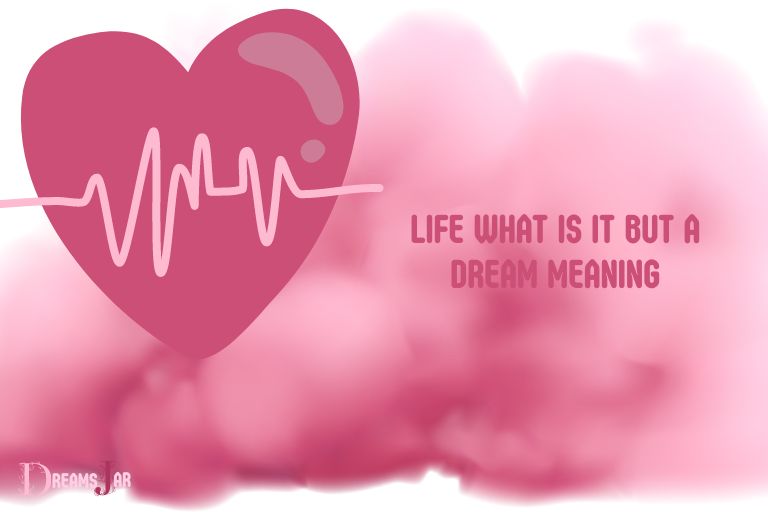Life What Is it but a Dream Meaning: Definition!
Immerse yourself in a contemplative journey as we explore the deeper meaning behind the phrase, “Life, what is it but a dream?” Dive into the philosophical interpretations of life as an illusion and its profound implications on our daily existence.
The phrase “Life, what is it but a dream?” symbolizes that life can be seen as an ephemeral illusion or temporary existence.
It invites us to ponder our perspectives on reality and encourages mindfulness in our daily activities.
Much like a dream, our lived experiences may feel real, but they are transient and ever-changing.
By likening life to a dream, we can develop mindfulness, appreciate the present, and accept the impermanence of our world.
Life What Is it but a Dream Meaning
| Interpretation | Description |
|---|---|
| Psychological Perspective | Life being a dream may represent the idea that our conscious experiences are a mere fraction of our true selves, and that our subconscious mind holds deeper truths and insights about the nature of reality. |
| Spiritual Perspective | Life as a dream can symbolize the belief in the temporary nature of our physical existence and the idea that our true nature is spiritual or divine, with our earthly experiences serving as opportunities for growth and self-discovery. |
| Philosophical Perspective | From a philosophical standpoint, life as a dream can be viewed as a metaphor for the subjective nature of reality, where our perceptions and experiences may not necessarily reflect objective truth. |
| Existential Perspective | The life-dream metaphor can highlight the idea of existential uncertainty, where we continually search for meaning and purpose in our lives while grappling with the possibility that there may be no inherent meaning to our existence. |
| Escapism | Viewing life as a dream can also signify a desire to escape from the challenges and struggles of everyday life, seeking solace in the idea that our experiences are temporary and not entirely real. |
| Personal Growth | The concept of life as a dream can serve as a reminder to embrace personal growth and self-improvement, as dreams often symbolize our innermost thoughts, fears, and desires, allowing us to better understand ourselves and strive for a more fulfilling existence. |
Key Takeaway

Five Interesting Fcacts About Life What Is It But A Dream Meaning
Exploring The Depths Of Existence
The Purpose Of Life: Seeking Meaning And Fulfillment
Life, what is it but a dream?
This timeless question has puzzled philosophers, theologians, and scientists alike for centuries. We find ourselves on this journey called life, navigating through its joys and sorrows, searching for purpose and meaning.
Understanding The Complexity Of Existence
- Life, a fascinating enigma, presents us with a myriad of questions.
- It is a complex tapestry woven together by our thoughts, emotions, actions, and interactions.
- Existence encompasses the physical, social, and spiritual dimensions of our being.
- We strive to unravel the mysteries of life, contemplating our place in the grand scheme of things.
Discovering Personal Purpose
- Each individual embarks on a unique journey, driven by their own ambitions, goals, and desires.
- Finding our purpose in life is often a process of self-discovery, understanding who we are, and what truly matters to us.
- Reflecting on our passions, talents, and values can provide valuable clues to identifying our personal purpose.
- It is a continuous exploration, requiring self-reflection, introspection, and an open mind.
Seeking Meaning In Relationships
- Relationships play a crucial role in our lives, offering opportunities for growth, love, and connection.
- Building and nourishing meaningful connections with loved ones, friends, and even strangers adds depth and purpose to our existence.
- Through these relationships, we learn important life lessons, experience empathy, and contribute to the well-being of others.
- Genuine human connections bring immense joy, fulfillment, and a sense of belonging.
Embracing The Journey Of Growth
- Life’s purpose extends beyond fulfilling our individual desires. It encompasses personal growth and contributing to the betterment of society.
- Embracing challenges, setbacks, and failures as opportunities for growth helps us evolve into our best selves.
- Lifelong learning and continuous self-improvement empower us to make a positive impact on our immediate surroundings and the world at large.
- Making a difference, no matter how small, can give our existence a profound and lasting purpose.
Finding Fulfillment In The Present Moment
- While pondering the purpose of life, it’s crucial to remember that true fulfillment lies in the present moment.
- Being mindful and fully engaged in the present allows us to appreciate life’s beauty, experience profound joy, and find contentment.
- It’s a journey of embracing gratitude, cultivating inner peace, and cherishing every moment we have.
- By living with intention and embracing the here and now, we can find purpose and fulfillment in the simplest of experiences.
As we delve into the depths of existence, we realize that the purpose of life is a multi-faceted concept. It is a journey of self-discovery, meaningful relationships, personal growth, and embracing the present moment.
Ultimately, the purpose lies in finding our own unique path, contributing to the world around us, and living a life aligned with our values and passions.
So, let us embrace the dream of life and embark on this extraordinary adventure with open hearts and minds.
The Intricate Tapestry Of Dreams
Dreams have captivated and mystified humanity for centuries. These enigmatic experiences that occur during sleep have intrigued philosophers, psychologists, and spiritual seekers alike.
What is the meaning behind these subconscious adventures?
How can we unravel the symbolism hidden within the fabric of our dreams?
Understanding Dreams: A Gateway To Self-Discovery
- Dreams provide a unique window into our subconscious mind, offering valuable insights and revelations about ourselves.
- They offer a direct line of communication with our deepest desires, fears, and unresolved conflicts.
- By analyzing our dreams, we can gain a clearer understanding of our emotions, motivations, and personal growth.
- Dreams can aid in self-discovery, helping us uncover hidden aspects of our personality and untapped potential.
- Exploring our dreams can lead to increased self-awareness, improved problem-solving skills, and enhanced creativity.
Unraveling The Symbolism: Decoding The Language Of Dreams
- Dreams often speak to us through symbols and metaphors, using a language unique to the dream world.
- Deciphering these symbols requires a keen eye and an open mind. It is a process of unraveling the complex layers of meaning embedded within our dreams.
- Common dream symbols, such as flying, water, or animals, carry specific connotations that vary based on individual experiences and cultural backgrounds.
- Keeping a dream journal can be immensely helpful in identifying recurring symbols and patterns, allowing us to unlock the deeper meaning behind these dream fragments.
- Dreams can also act as a mirror, reflecting our subconscious thoughts and emotions. By examining the emotions and experiences portrayed in our dreams, we can better understand and address our waking state.
Dreams possess an undeniable allure and hold the potential to guide us on a path of self-discovery.
As we endeavor to decipher the intricate tapestry of dreams, let us embrace the mysteries they offer and embark on a journey of exploration and enlightenment.
Through understanding and unraveling the symbolism woven within our dreams, we can unlock the profound wisdom they hold, ultimately gaining deeper insights into ourselves and the world around us.
Embracing The Illusion: Life As A Dream
Life, what is it but a dream?
This intriguing concept has fascinated philosophers, scientists, and dreamers throughout the ages.
Could it be possible that our existence is akin to a vivid dream, an illusion that we navigate through?
Ancient Wisdom: Philosophical Perspectives On The Dream-Like Nature Of Life
- The illusion of life: Ancient philosophers proposed that life is nothing but an illusion, a dream-like state where reality is subjective and ever-changing.
- Plato’s allegory of the cave: Plato compared our perception of reality to prisoners trapped in a cave, only able to see shadows of true forms. He argued that true knowledge comes from transcending the illusion and experiencing the ultimate truth.
- Eastern philosophies: Concepts such as maya in hinduism and buddhism’s idea of the illusory nature of existence reflect the belief that we are living in a dream-like reality, where our senses deceive us.
Quantum Realities: Scientific Theories And Their Link To Dream Existence
- Quantum mechanics and parallel universes: Some scientific theories suggest the existence of multiple parallel universes, each with its own set of physical laws. These theories posit that our reality is just one of countless possibilities, like different dreams coexisting simultaneously.
- Observer effect: Quantum physics shows that the act of observation affects how particles behave, suggesting that consciousness plays a fundamental role in shaping reality. This parallels the power of our thoughts and intentions in shaping the dream-like world we perceive.
- Non-locality and interconnectedness: Quantum entanglement demonstrates that particles can be connected across vast distances, instantaneously impacting each other’s states. This interconnectedness mirrors the universal interconnectedness often experienced in dreams, where events and people are mysteriously intertwined.
Life, as we know it, may indeed be a dream, a profound illusion where reality is not fixed, but malleable.
Whether through the lens of deep philosophical contemplation or the intricacies of quantum physics, the dream-like nature of our existence invites us to question the boundaries of what we perceive.
As we delve deeper into these notions, we may find that embracing the illusion of life can lead us to a greater understanding of ourselves and the nature of reality itself.
Navigating The Dreamscape: Creating A Meaningful Life
Dreaming With Intent: Setting Goals And Pursuing Passions
When it comes to living a meaningful life, setting goals and pursuing passions are essential. By dreaming with intent and taking deliberate actions, we can shape our lives into something purposeful and fulfilling.
Here are a few key points to consider:
- Determine your passions: Take time to reflect on what truly ignites your interest and fuels your enthusiasm. Identify the activities and hobbies that bring you joy and fulfillment. Discovering your passions will provide you with a sense of direction as you navigate your dreamscape.
- Set smart goals: Establishing goals that are specific, measurable, attainable, relevant, and time-bound is crucial. Smart goals help you focus your efforts, track your progress, and keep you motivated along the way. Remember to break down big goals into smaller, actionable steps to make them more manageable.
- Create a vision board: Visualize your dreams and aspirations by creating a vision board. Collect images, quotes, and words that represent your goals and dreams. Displaying this board in a prominent place will serve as a daily reminder of what you are working towards, inspiring you to stay focused and driven.
Overcoming Obstacles: Finding Strength And Resilience In The Dream Journey
On the path to creating a meaningful life, obstacles are inevitable. However, it is how we handle these challenges that truly define us.
Here are a few tips for overcoming obstacles and finding strength along the dream journey:
- Embrace a growth mindset: Adopting a growth mindset allows you to see setbacks as opportunities for learning and growth. Rather than viewing failures as the end of the road, see them as stepping stones towards success.
- Cultivate resilience: Resilience is the ability to bounce back from adversity. Nurture resilience by developing coping mechanisms and practicing self-care. Surround yourself with a support network of family, friends, and mentors who can provide guidance and encouragement during tough times.
- Learn from setbacks: Every setback offers valuable lessons. Take the time to evaluate what went wrong and why. Use this knowledge to adjust your approach, develop new strategies, and keep moving forward. Remember, setbacks are not failures, but opportunities for growth and improvement.
By dreaming with intent, setting goals, pursuing passions, and overcoming obstacles, we can create a meaningful life that aligns with our dreams and aspirations.
The journey may not always be easy, but with determination and resilience, we can navigate the dreamscape and turn our dreams into reality.
Awakening To The Truth: Finding Meaning Beyond The Dream
Life, what is it but a dream? This age-old question has perplexed philosophers, spiritual seekers, and curious minds for centuries.
As we navigate through the tapestry of existence, there comes a time when we awaken to a deeper truth, a truth that transcends the illusions of the dream.
Transcending Illusion: Exploring Spiritual And Transpersonal Experiences
Spiritual experiences are moments of transcendence that take us beyond the physical realm. These experiences may include visions, mystical encounters, or a deep sense of connection with something greater than ourselves.
They offer a glimpse into the infinite possibilities and dimensions of existence.
Transpersonal experiences transcend the individual self and encompass a broader sense of interconnectedness with all of creation.
These experiences often lead to a profound shift in perspective, as we realize that we are not separate from the world around us but deeply intertwined with it.
Embracing The Mystery: Embodying Presence And Surrendering To The Flow
Embodying presence means fully inhabiting the present moment and cultivating a deep sense of awareness.
When we are fully present, we can let go of regrets from the past and worries about the future, allowing ourselves to experience life’s beauty and wonder in its entirety.
Surrendering to the flow is about relinquishing our need for control and surrendering to the natural rhythm and unfolding of life.
It is about trusting in the inherent wisdom of the universe and recognizing that we are part of a grand symphony that is being orchestrated beyond our comprehension.
Life, in all its complexity and mystery, is not merely a string of random events. It is a canvas upon which we can paint our own unique masterpiece.
As we awaken to the truth beyond the dream, we come to understand that life is not something to be grasped or conquered, but rather, something to be embraced and cherished.
So, let us embark on this journey of awakening, transcending illusions, exploring spiritual and transpersonal experiences, and embracing the mystery.
In doing so, we may just discover a profound meaning that surpasses our wildest dreams.
FAQ About Life What Is it but a Dream Meaning
What is the meaning behind the phrase “Life is but a Dream”?
The phrase “Life is but a Dream” is an ancient proverb that suggests life is an illusion—that our lives are ephemeral and are ultimately temporary. It implies that reality is a construct and is ultimately subjective.
Where did the phrase “Life Is But a Dream” originate from?
The phrase “Life is but a dream” has its origin in ancient Chinese philosophy and is also featured in a poem written by German Romantic poet, Novalis.
What is the main message of the phrase “Life Is But a Dream”?
The main message of the phrase “Life Is But a Dream” is that life should be lived in the present moment and enjoyed with mindfulness, as there is no guarantee how long our dreams will last or what the future holds.
Why is it important to remember that “Life is But a Dream”?
It is important to remember that “Life is But a Dream” because it encourages us to live in the present moment, take risks, and seize opportunities as they come. We should use our time wisely and make the most our of our fleeting existence because before we know it, the dream will be over.
Bonus Topic For-Life What Is it but a Dream Meaning
What is the Philosophical Meaning of Life as a Dream?
The philosophical meaning of life as a dream suggests that our existence and experiences, much like dreams, may be ephemeral or illusory.
This concept invites contemplation on the nature of reality and the transient quality of our lives, urging us to question our perceptions and find deeper understanding or purpose.
- Contemplation on the ephemeral nature of life
- Questioning the nature of reality
- Seeking deeper purpose or understanding
What Impact Does Life as a Dream Have on Human Psychology?
The concept of life as a dream suggests that our experiences and perceptions may be temporary and illusory.
This notion can have a profound impact on human psychology, influencing how we interpret reality and cope with challenging situations.
- Increased curiosity and introspection
- Enhanced mindfulness and self-awareness
- Encourages emotional detachment
- Promotes resilience in dealing with unpredictability
- Potential for solipsistic or dissociative tendencies
What Are The Benefits and Drawbacks of Viewing Life as a Dream?
Viewing life as a dream can have both positive and negative impacts on our perception and actions. It can inspire creativity, detachment, and mindfulness, but can also lead to a sense of disconnection, lack of responsibility, and lack of fulfillment.
Benefits:
- Encourages creativity and exploration
- Promotes mindfulness and acceptance
- Helps with detachment from materialism and ego
- Can reduce stress and anxiety
Drawbacks:
- May lead to disconnection from reality
- Can result in a lack of responsibility and accountability
- May hinder the pursuit of meaningful goals or accomplishments
- Potential to promote passivity or avoidance
Conclusion
In essence, viewing life as a dream is a philosophical outlook that has existed for centuries, and it can impact human psychology in both positive and negative ways.
Considering life as a dream can provide a sense of detachment and allow people to let go of attachment to material possessions and experiences.
However, it can also lead to an apathetic or nihilistic attitude towards life.
Moreover, the concept of life as a dream can be a useful way to reframe one’s experiences and understand the impermanence of life.
Overall, life as a dream is a complex and multi-faceted concept that has the potential to alter one’s outlook on life in various ways.
The best course of action would be to explore this viewpoint with an open mind and critical thinking to identify how it can benefit one’s personal growth and development.
TL;DR:
- View of life as a dream is a philosophical outlook that has existed for centuries.
- It can provide detachment but lead to apathy/nihilism.
- The concept helps understand the impermanence of life.
- Explore the concept with an open mind for personal growth and development.
Action List:
- Consider exploring the concept of life as a dream with an open mind.
- Reflect on the potential benefits and drawbacks of adopting this viewpoint.
- Practice detachment without falling into nihilism or apathy.
- Use the concept to help understand the impermanence of life.
According to a study by the American Psychological Association, people who viewed their lives as a dream were more likely to have a greater sense of purpose and well-being compared to those who saw their lives as a harsh reality.
Who said life is but a dream?
“Who said life is but a dream?” is a famous quote by Lewis Carroll in his book “Through the Looking-Glass.”
The quote suggests that life might be just a fleeting illusion or a figment of our imagination. It means that everything we experience in life may not be real and that our existence is temporary.
The quote has been interpreted in various ways by different people, but it remains a thought-provoking phrase that encourages introspection.
What is the meaning of life is but an empty dream?
The phrase “Life is but a dream” suggests that life is fleeting and temporary, much like a dream. It highlights the idea that our time on earth is limited and that we should make the most of it.
The meaning of life, in this context, is to experience the world around us and to create a meaningful existence despite its transience.
It is a reminder that we should cherish each moment and strive to leave a positive impact on the world.
What is the meaning of life is not a dream?
The meaning of life has been a philosophical question for centuries. The phrase “Life is but a dream” suggests that life may not be the reality we perceive it to be, but rather a fleeting illusion.
This phrase has been interpreted in many ways, but it often refers to the temporary nature of our existence and the uncertainty of its purpose.
Some philosophers argue that the meaning of life is subjective and up to the individual to define, while others propose that it is inherent and universal.
Ultimately, the search for the meaning of life is a personal journey that may lead to different conclusions for each individual.
• Philosophical interpretations of “Life is but a dream”
• The temporary nature and uncertainty of our existence
• Subjective versus inherent meaning of life
What is the line life is a dream is an example of?
The line “life is but a dream” is an example of a metaphor, which compares the ephemeral nature of life to the fleeting nature of a dream.
This phrase is often used in poetry and literature to emphasize the idea that life is temporary and fleeting, and that our experiences and accomplishments are ultimately illusory.
This phrase can be traced back to ancient philosophy, where the idea of life as a dream was often used to question our perceptions of reality and the nature of existence.
- This phrase is often used in poetry and literature.
- Life is temporary and fleeting, and our experiences are illusory.
- The idea comes from ancient philosophy to question the nature of existence.
Is life itself a dream?
The concept of life being a dream has been a topic of philosophical debate for centuries. Some argue that life is just an illusion, a projection of our own minds, while others believe that it is a concrete reality.
The idea of life being a dream may be interpreted in a variety of ways, depending on one’s perspective. The following are some possible perspectives on the idea of life being a dream:
- From a spiritual perspective, life may be seen as a dream because it is impermanent and ultimately unreal in the face of the eternal nature of the universe.
- From a psychological perspective, life may be seen as a dream because our thoughts and emotions create our perceptions of reality.
- From a philosophical perspective, life may be seen as a dream because it is impossible to know with certainty whether our perceptions of reality are accurate or merely subjective.
- From a poetic perspective, life may be seen as a dream because it is a fleeting and ephemeral experience that can be likened to the transitory nature of a dream.
While there is no definitive answer to the question of whether life is a dream or not, contemplating this idea can lead to greater self-awareness and a deeper understanding of the nature of reality.
What is life compared to in dreams?
The phrase “life is but a dream” suggests that life is fleeting and ephemeral, like a dream.
This idea has been explored in literature and philosophy throughout history, and has been interpreted in many different ways.
Some see it as a reminder to appreciate the present moment, while others see it as a nihilistic view that suggests life has no inherent meaning.
Regardless of the interpretation, the phrase is a powerful reminder of the impermanence of life and the importance of cherishing our time here.
What is difference between dream and reality?
Dream and reality are two different concepts. Dream is a state of mind where we experience thoughts, images, and sensations during sleep; whereas, reality is the tangible existence of things that we can perceive, experience, and interact with in the physical world.
While our dreams can be influenced by our reality, they are not necessarily connected to it.
In life, we often have to navigate between our dreams and reality to find meaning and purpose.
It is important to distinguish between the two and understand how they can complement or conflict with each other.
- Dreams are subjective experiences that occur during sleep.
- Reality is the tangible existence of things in the physical world.
- Dreams can be influenced by our reality, but they are not necessarily connected to it.
- Navigating between dreams and reality is essential to finding meaning and purpose in life.
Why do dreams relate to real life?
Dreams are often a reflection of our deepest desires, fears, and subconscious thoughts. They can also be influenced by our real-life experiences.
Our brain processes and stores information during the day, which sometimes resurfaces during our sleep as dreams.
Dreaming may help us process emotions, relieve stress, and make sense of our experiences. Some researchers even suggest that dreams may have a function in problem-solving.
Therefore, it is not uncommon for dreams to relate to real-life events or people. The meaning of dreams in relation to real life can vary widely and can be interpreted in many ways.
- Dreams reflect our subconscious thoughts and emotions
- Our brain processes and stores information during the day
- Dreams may help us process emotions and make sense of our experiences
- Dreams can be influenced by real-life events and people.






